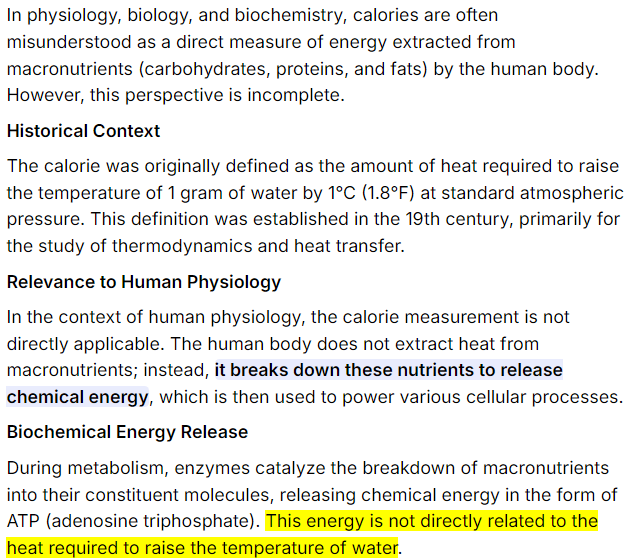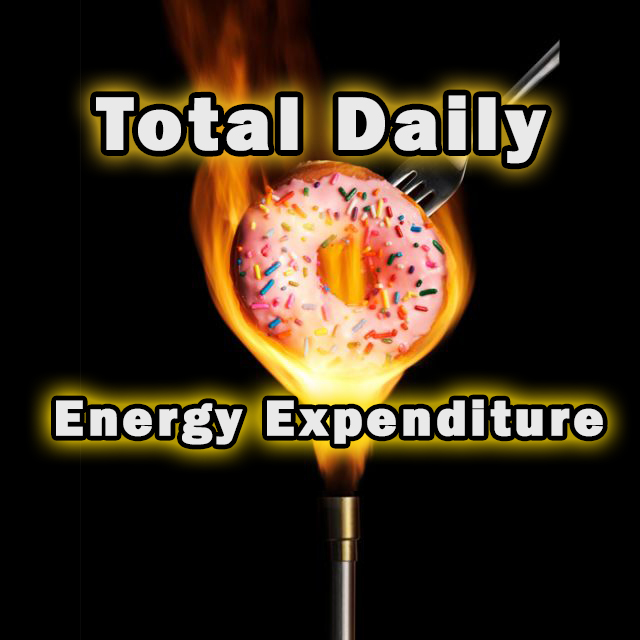I posted this about a year ago in my groups on Facebook (January 2019.) If you still think that calories are important or even a thing, please take a few minutes and educate yourself.
The TDEE formulas are derived from an average of people following a typical westernized/modern diet. This kind of diet is high carbohydrate and made up of at least 70 to 80 percent of plant foods (keep in mind that almost all junk food, soft drinks, etcetera are made from plant foods and plant (seed) oils.) And we know that plant foods contain fiber (that binds up proteins and makes them non-absorbable,) antinutrients (that block minerals,) contain no usable vitamins and a lot of toxins that causes inflammation, and that the carbohydrate content (starches) is mostly indigestible – especially if the ‘food’ have been reheated. This means that on a typical ‘fitness’ diet, your calorie- and macronutrient program might show 200g protein, 200g carbohydrates, 80g fat, and 2300 “kilo-calories.” But in reality, you might only absorb 160g protein, 120g carbohydrates, 60g fat, and get only 1700 “kcal!” And if you have gut issues, as most people who consume plant foods have, you may absorb even less. In other words, these ‘energy requirement’ calculations are very skewed and totally useless.
With that in mind, what do you think will happen when you go full animal-based/carnivore, as in our species appropriate diet, and you actually absorb 91 to 95 percent of what you consume? Yes, you will only need 60 to 70 percent of the “calories” you used to consume if you use the same TDEE formula and do stupid “calorie counting” (I’ll explain that nonsense in a bit.) And no, this will not make you hungry as a nutrient-dense animal-based diet will cover all your nutritional needs. Hunger and cravings are simply a sign of nutrition deficiencies. When your body is lacking one or more nutrients, it will tell you by the feeling of hunger and cravings. That is why clueless people on idiotic fad-diets get hungry all the time.
Now, on to the faulty concept of ‘calories.’ It’s important to understand that there are no “calorie receptors” in our body. Your body does not measure how many ‘calories’ it gets. It has no idea. Calories are a concept of physics, not a concept of physiology. Calories are simply a unit of heat-energy from burning something and increasing the temperature of a given mass of water by 1 °C. That is not how our bodies work. We do not extract energy from food to produce heat, we extract energy from food to provide components for our metabolic functions — whether it be for muscle contractions, repair of tissue, building hormones, or for chemical reactions in our brain, and so on.


And when this calorie dogma was established, it did not account for the thermic effect of protein in our bodies, still both carbohydrates and protein were inappropriately ascribed 4 kcal per gram. And it does not account for the fact that almost no protein at all is oxidized as energy for metabolic processes, as it is used structurally for our body; for tissues, enzymes, hormones, etc.
If you still hear ‘experts’ going on about calories, and calories in versus calories out (CICO) they are not ‘experts’ at all, they are indoctrinated and totally oblivious to human physiology. Just as the muppets recommending plant foods that are contraindicated to our species appropriate diet of animals and the produce of animals. Also, if you place 100 “calories” of sugar in your mouth, the physiological response is totally different from if you were to place 100 “calories” from animal fat in your mouth. While ‘energy’ matters, ‘calories’ does not, as it’s a retarded and very flawed way of trying to ‘measure’ energy contents of different foods or of energy expenditure from exercise.
So, if you swallow that sugar, you get an insulin response. If you swallow the fat, you get no insulin response at all. The body responds to hormones and that is how it knows what to do when you have consumed something. The sugar will act like a poison, so your body will try to get rid off it as quickly as possible so it can keep the blood glucose level at a non-harmful level. The fat on the other hand will be used as energy and building blocks for hormones. So much for the idiotic nonsense of “it doesn’t matter what you eat to lose body fat as long as you are in a energy deficit.”
Again, if you consume carbohydrates, insulin will go up. If you consume protein, insulin will go up, and so will your protein synthesis by the activation of mTOR and some other signaling pathways. Also, the amino acids in that protein are used for producing enzymes and repairing tissue.
In other words, there are different receptors for amino acids, for fat, and for hormones that will be activated by what we eat or do.
If your nutritional base is covered, your inclination to overeat will be very low and since you consume nutritional-dense animal foods, you will be satiated very quickly. Your body will also be much more efficient by not wasting energy on unnecessary digestion, and your absorption of nutrients will be top-notch, which means that your need for ‘energy’ or “calories” will be much lower than someone with gut issues and bad absorption (as in vegans, vegetarians and most people following a typical modern ‘balanced’ diet with harmful foods.)
In other words, energy requirements, as in ‘calories’, vary greatly from person to person. Calculating your energy requirement is not as simple as trying some formulas for muscle tissue, metabolic rate and activity levels, it’s also about food choices and composition, general health, hormone levels, and especially gut health.
So, as a coach, when someone is switching to an animal-based diet, I look at previous nutritional habits and diets, medication, gut health, muscle mass and body weight, daily activity, exercise, and a lot more. I use several calculations as well as experience to get to a ‘energy’ baseline where we will start. From there it’s all about observation and feedback. Every 2 to 3 weeks we evaluate and adjust the intake of food. And when adjusting, it’s not only about the energy within the food, it’s about macronutrient ratios, choice of food stuff/sources (replacing/switching things around to get where we want to go), and so on.
And as your body heals, your gut flora improves, and previous hormone imbalances get resolved, your energy needs will shift and then stabilize. And in the end, when you’re healthy in body and mind, you will instinctively eat what you need and when you need to. When following our natural species appropriate carnivore diet, it’s actually very simple. And in the end, all you need to do, from time to time, is to evaluate your progress toward your goals and adjust from there.
If you want to gain weight, you’ll have to make sure to eat more than you normally do — you might actually need to force yourself if you follow a sensible diet as you will be satiated most of the time. If you want to lose body fat really fast while preserving or even building muscle mass — just eat to satiation and then fast for a couple of days a week. It’s super easy when your body works as it is supposed to by getting all the essential nutrients from animal food.
